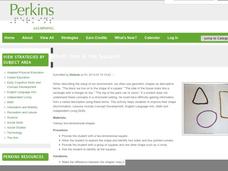Perkins School for the Blind
Conversation Skills
It is so important for learners with multiple disabilities to learn how to communicate for both social and functional reasons. Each child will choose a topic from the list and generate five questions related to that topic. They'll split...
Stanford University
Close Reading
Here's a poster that highlights the skills needed for the close reading of primary source documents when gathering evidence to support historical claims.
Perkins School for the Blind
Telephone Skills
What kid doesn't love talking on the phone? Learners with visual and intellectual disabilities get comfortable using several types of telephones. They begin by examining the phone, dialing, answering the phone, and then they work into...
Perkins School for the Blind
Left Versus Right
When you can't see, it is extremely important to be able to reorient yourself. Learners with visual impairments work though an activity to build spacial awareness based on moving left and right. A marker (bracelet, bell, or weight) is...
Perkins School for the Blind
Grocery Shopping
Grab those reusable bags, it's time to go shopping! Intended to foster independent living skills in learners with visual impairments, the lesson covers several topics related to grocery shopping. They start by planning a meal, reading...
Perkins School for the Blind
Taking Turns
For small children or learners with disabilities, learning to wait patiently and taking turns is very important. In pairs, two children with visual impairments take turns asking for, waiting for, and playing with a musical...
Perkins School for the Blind
Learning to Identify Sounds Made by the Body
Sneeze, snap, tap, and whistle; Did I do that? Explore the parts and sounds of the human body with your learners with visual impairments. First you'll name the parts of the body, make a sound with each part, and then have the class...
Perkins School for the Blind
Let's Pretend
Playing pretend with real objects or concepts is a wonderful way for learners to make object-to-action connections, as well as practice daily living skills. Learners with visual and intellectual disabilities use a wide variety of real...
Perkins School for the Blind
Put the Shoe on Your Foot
Promote clothing identification, body part identification, and dressing skills acquisition with a fun and lively game. Each child takes turns grabbing a clothing item from the central clothing box. As he puts the item on, he sings,...
Perkins School for the Blind
Circle Time
Oftentimes children or teens with one or more disability are reluctant to participate in whole-group activities. Foster good participation, verbal expression, and social skills through daily circle time activities. Each day you and...
Perkins School for the Blind
Personal Information
"Hi, how are you? My name is___." Seems simple enough but it's not always that easy to recall and relate factual information about yourself. Learners with multiple disabilities practice memorizing and relaying personal information about...
Perkins School for the Blind
Build a Word
Get out those scrabble tiles and a braille tape labeler because today we are playing a build-a-word game! Label several sets of scrabble tiles using the braille labeler, place them in a box, and have children take turns pulling letter...
Perkins School for the Blind
A Visit to the Doctor
Going to the doctor's office may be a source of stress and uncertainty for some children. Help your learners with special needs discover what to expect at and how to cope with their next trip to the doctor. They explore real medical...
Perkins School for the Blind
Letter Confusion
Teaching a child with low or no vision how to read is the same as teaching a sighted child how to read — it all starts with letter recognition. This is a simple way to provide your learners with an opportunity to practice reading and...
Perkins School for the Blind
Treasure Hunt
On, over, and under are some very common prepositions; but how can you teach these concepts to children with visual impairments? Here, is one way. Kids will practice following verbal commands as they go on a classroom treasure hunt. They...
Perkins School for the Blind
Which One is the Square?
Children who are blind need to constantly be engaged in building conceptual understandings of the world around them. This activity will help them grasp the concept of shape, identify shapes, and consider shapes as they are used to...
Curated OER
The Game is Afoot - A Study of Sherlock Holmes
Mystery is an exciting genre for young readers to investigate. The plots are so intriguing! Here is a series of lessons featuring Sherlock Holmes stories that invite learners to enter the world of the mystery genre. Based on what...
New York City Department of Education
Geography and Early Peoples of the Western Hemisphere
Young historians discover the early people of the western hemisphere. The unit explores how the land changed, how it was used and homes of early Americans such as Incas, Mayans, Inuits, Aztecs, and Pueblos. Individuals also examine these...
New York City Department of Education
Colonial America and The American Revolution
How did the founding of the American colonies lead to a revolution? Use the essential question and sample activities to guide learners through a series of history lessons. Additionally, the packet includes effective strategies to...
Curated OER
Cowboy and Pirate Books for Everyone
Share these terrific books that span all ages and grade levels with your children.
Perkins School for the Blind
Familiar Sounds
To foster concept development and auditory discrimination skills, learners with visual impairments listen to identify a variety of common sounds. The teacher makes recordings of various sounds, including those found in the home, at the...
Perkins School for the Blind
Initial Consonant Activity
Bingo is a super fun game and can be used to reinforce a vast number of recognition skills. These bingo cards are prepared by constructing nine squares, each delineated with raised Wikki Stix or gluedyarn and containing a...
Perkins School for the Blind
Hat Game
Sometimes the simplest ideas foster a lot of different skills. To boost social skills, group participation, identifying others by name, and dressing skills, learners play the hat game. They take turns wearing a hat while...
Perkins School for the Blind
Baseball
Baseball is an American pastime, super fun to play, and can be made accessible to learners with visual impairments. Instead of taking to the ball field, your class can learn the rules of the game by playing a small three-dimensional...























